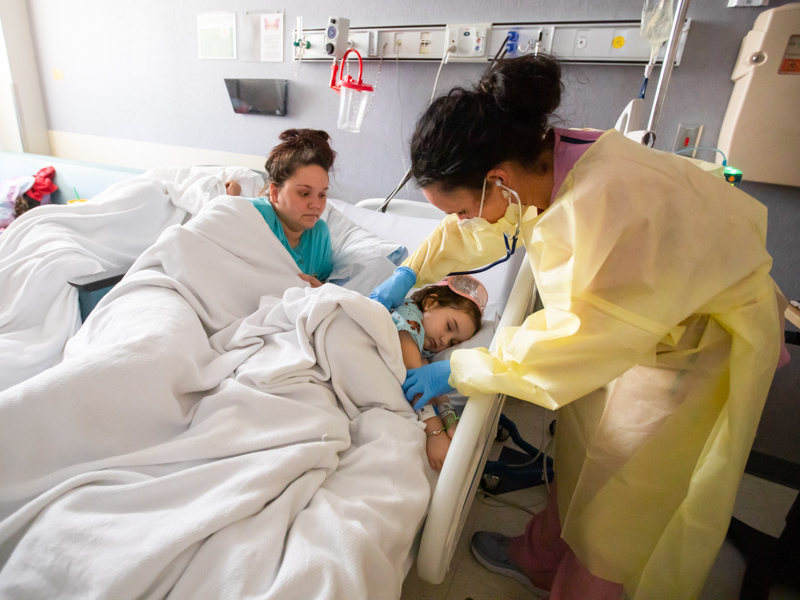More COVID-related pediatric hospitalizations to come, UMMC experts warn

When Dr. Charlotte Hobbs sees rising numbers of children contracting COVID-19, today’s number of children hospitalized with the virus is only one of her concerns.
Looming in the future is a rise in cases of Multisystem Inflammatory Syndrome in Children, or MIS-C, a rare but serious condition that follows a COVID-19 infection, even one that was asymptomatic.
The MIS-C cases are already increasing, said Hobbs, a professor and pediatric infectious disease specialist who does follow-up care for kids treated at the University of Mississippi Medical Center’s MIS-C clinic.

“On Friday, we had six pediatric patients being treated or evaluated for MIS-C,” Hobbs said. “That is the most we’ve ever had at one time, and that is up from zero a month ago. That’s a dramatic increase.”
During previous COVID-19 surges, the children’s hospital never had more than one or two MIS-C cases at one time, said Dr. Mary Taylor, Suzan B. Thames Chair, professor and chair of pediatrics.
“We’re concerned about this MIS-C surge,” she said. “Children with MIS-C can get very sick very quickly.”
MIS-C is a delayed reaction of the immune system to a COVID-19 infection. During a case of MIS-C, the immune system of a child who has been infected with COVID-19 attacks the body’s healthy cells, particularly those involving blood vessels, the heart and other organs.
Children’s of Mississippi, the pediatric arm of UMMC that includes the state’s only children’s hospital, has treated 69 cases of MIS-C since the start of the COVID-19 pandemic, and that number is growing. Statewide, at least 75 children have been diagnosed with the condition.
Nationally, there have been more than 4,400 cases of MIS-C, with 37 deaths, but the CDC acknowledges those numbers may be low, since states report MIS-C voluntarily.
"Mississippi’s number of MIS-C cases is higher than that of some states because of our lower rate of vaccination and prevention of SARS CoV-2 infection, which is associated with the development of MIS-C,” Hobbs said.
With MIS-C following COVID-19 infections by a few weeks or even months, the condition will most likely increase the need for hospitalization, Hobbs said.
“This is why we have to protect children, many of whom are too young to be vaccinated, and we can do that by getting vaccinated, wearing face masks and social distancing,” she said.
Pediatric cases are about 21 percent of all new COVID-19 cases in the state. That rise in cases is reflected in hospitalizations at UMMC. On Monday, UMMC recorded a record 30 pediatric patients hospitalized as the result of COVID-19.
One of the six MIS-C patients at Children’s of Mississippi Friday was Emma Corley, a 4-year-old from Lumberton who was recuperating from the condition. She arrived at the children’s hospital Aug. 18 with a fever of over 103, said her mother, Crystal Head.
“We were scared for her,” she said. “I tried to keep her calm in the ambulance by playing eye-spy with colors and shapes.”
Emma, along with the rest of her family, was diagnosed with COVID-19 Aug. 2.
“She and her sister only had runny noses,” she said, “Their symptoms were mild. We didn’t know anything about MIS-C.”
Emma’s recovery has included care from specialists in fields including cardiology and rheumatology.
The median age of children with MIS-C is 9, according to the U.S. Centers for Disease Control and Prevention.
“MIS-C can be life-threatening for children, but if it is diagnosed, it can be treated,” Hobbs said. The average hospital stay for MIS-C is about a week, and many times, that can include days in intensive care.
Early MIS-C symptoms include fever for more than a day. Other symptoms may also include vomiting, diarrhea, neck pain, rash, bloodshot eyes and fatigue. Parents seeing these warning signs in their children should seek care immediately to prevent MIS-C from becoming a life-threatening condition.
“If your child has had COVID and runs a fever a week or more later, get care,” Head said. “We were lucky that Emma got care early. The sooner your child gets treatment, the sooner they get better.”

LeAnn Henderson of Terry agrees, and after her daughter, Allie, 14, was diagnosed with MIS-C in Children’s of Mississippi’s pediatric intensive care unit earlier this year, she encourages families and children who are eligible to take the COVID-19 vaccine. The Pfizer-BioNTech vaccine was approved by the FDA Monday for children as young as 16.
“Please consider having your child vaccinated,” she said. “Everybody’s body is different, therefore COVID affects us all differently. Educate yourself on the signs and symptoms of MIS-C, and don’t think that this would never happen to your child.”
Henderson advised Mississippi parents to take COVID-19 and MIS-C seriously and get care immediately if experiencing MIS-C symptoms.
"Watching your child suffer and fight for her life is the hardest, most terrifying experience I have ever encountered,” Henderson said.
Children younger than 12 are not eligible to be vaccinated against COVID-19.
“They should be protected,” Hobbs said. “Vaccinations of those who are eligible, along with wearing face masks, can keep children protected.”


